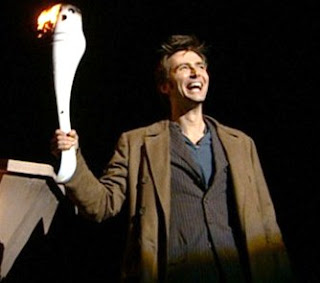It's Olympics time in London, and one of the torchbearers leading up to the final lighting of the cauldron was TNG's Patrick Stewart. Another was Matt Smith, the current Doctor Who, and the TARDIS itself was part of the opening ceremony.
In so-called real world news, Voyager 1 reaching the edge of the solar system has prompted science professor Adam Frank to suggest that the human future in space is very likely limited to our own solar system--there is little chance for warp drive. (But as Kim Stanley Robinson's new novel 2312 demonstrates, the solar system provides dazzling opportunities for that future.)
On the other hand, the confirmed discovery of the long-predicted Higg's boson--the biggest science news this year--may lead to unforeseeable new technologies, at least according to one of the key scientists in the field: "The discovery is so fundamental to the laws of nature, Incandela said, that it could spawn a new era of technology and development in the same way that Newton's laws of gravity led to basic equations of mechanics that made the industrial revolution possible. "This is so far out on a limb, I have no idea where it will be applied," he added. "We're talking about something we have no idea what the implications are and may not be directly applied for centuries."
Meanwhile, as scientists study the area just outside the solar system, it is showing characteristics that are "stranger than expected." For one thing there's free floating oxygen out there, leading to the possibility of unknown life forms in space.
One pioneer who continues to work towards the human future in space is Peter Diamandis, founder of the X Prize. In his new interview with Wired, he mentions being inspired by the original Star Trek series.
Extrasolar research continues to yield discoveries, too, including an alien solar system much like our own. Some 10,000 light years away it's got at least 3 orbiting planets.
In the same vicinity however, scientists have found a bizarre pairing of two planets, one of them huge, that are closer together than previously thought possible.
There's lots of speculation about the next Star Trek movie, especially on the summer convention circuit. But one review of the early summer hit The Avengers has a familiar ring to it. Devin Faraci attributes its success to a hunger for optimism and hope in bad times, which the movie fulfills because it is about "disparate people coming together to get things done." The same can be said--and of course has been said--about the success of Star Trek, and about its importance as a model for the future.





1 comment:
Great Olympics tie-in Captain Future I must have missed that episode. Firefly is a good example of the wonders within a single solar system, so who knows what's possible? Good astronomy news too.
Post a Comment